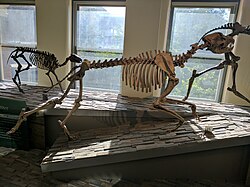Epicyon
|
Epicyon Temporal range: Early Miocene–Late Miocene |
|
|---|---|
 |
|
| Mounted E. haydeni skeleton | |
| Scientific classification | |
| Kingdom: | Animalia |
| Phylum: | Chordata |
| Class: | Mammalia |
| Order: | Carnivora |
| Family: | Canidae |
| Subfamily: | †Borophaginae |
| Genus: |
†Epicyon Leidy, 1858 |
| Type species | |
| †Epicyon haydeni |
|
| Species | |
|
|
Epicyon ("more than a dog") is a large, extinct, canid genus of the subfamily Borophaginae ("bone-crushing dogs"), native to North America. Epicyon existed for about 15 million years from the Hemingfordian age of the Early Miocene to the Hemphillian of the Late Miocene.
Epicyon, which was about 1.5 m (5 ft) long, had an estimated weight of 91–136 kg (200–300 lb).Epicyon had a massive head and powerful jaws, giving its skull a lion-like shape rather than that of a wolf.
Epicyon was one of the last of the Borophaginae and shared its North American habitat with other canids:
Epicyon was first named by Joseph Leidy in 1858 as a subgenus of Canis. It was also mentioned as belonging to Aelurodontina by William Diller Matthew & Stirton in 1930. Later studies indicates that it was not a species of Canis, but a borophagine.
Fossil specimens range from Florida to Alberta, Canada to California; from Nebraska, and Kansas to New Mexico and Texas.
...
Wikipedia
